Pixsy (day 210): I have found Declan's Motion to Dismiss to fight their threatened court action in an article titled "Defense Against the Dark Arts of Copyright Trolling". No sooner had we heard from them than they were named and shamed by Computer Weekly and it's a truly sickening read
Our Church and State website has no less than 63 Nobel Laureates on it despite the never-ending assault on our email; see paragraph 2 under "Church and State" on this blog's sidebar (updated today).

Fourth Notice: Unauthorized Use of Mr. Hiltscher's Image - Case Reference: 002-110889
9/12/20
These con men can do a lot electronically but enforcing their claim will require bringing a suit. Paying $249 is just a dispute=a small claim. Which has not been proven.
I would ignore and if the matter requires legal help we will help you but until then I would not send them a dime.
file:///C:/Users/Don/Downloads/002-110889_Unauthorised%20Use%20of%20Image.pdf\
Keep us posted.
Don
Article: "Defense Against the Dark Arts of Copyright Trolling" by Matthew Sag and Jake Haskell. Download PDF
ABSTRACT: In this Article, we offer both a legal and a pragmatic framework for defending against copyright trolls. Lawsuits alleging online copyright infringement by John Doe defendants have accounted for roughly half of all copyright cases filed in the United States over the past three years. In the typical case, the plaintiff's claims of infringement rely on a poorly substantiated form pleading and are targeted indiscriminately at noninfringers as well as infringers. This practice is a subset of the broader problem of opportunistic litigation, but it persists due to certain unique features of copyright law and the technical complexity of Internet technology. The plaintiffs bringing these cases target hundreds or thousands of defendants nationwide and seek quick settlements priced just low enough that it is less expensive for the defendant to pay rather than to defend the claim, regardless of the claim's merits.
We report new empirical data on the continued growth of this form of copyright trolling in the United States. We also undertake a detailed analysis of the legal and factual underpinnings of these cases. Despite their underlying weakness, plaintiffs have exploited information asymmetries, the high cost of federal court litigation, and the extravagant threat of statutory damages for copyright infringement to leverage settlements from the guilty and the innocent alike. We analyze the weaknesses of the typical plaintiff's case and integrate that analysis into a strategy roadmap for both defense lawyers and pro se defendants. In short, as our title suggests, we provide a useful guide to the defense against the dark arts of copyright trolling.
6 January: Pixsy have escalated their outrageous threat to our Church and State website (day 57). The Equality Advisory and Support Service distorts and dismisses Declan's case of discrimination. And the never-ending assault on our email has resulted in the sabotage of an offer of financial help to us personally
Automated image recognition: How using 'free' photos on the internet can lead to lawsuits and fines; Germany-based photographer Marco Verch uses computer scripts to populate the internet with topical images and photographs. People and companies who make mistakes in following the complex licensing terms of his 'free to share and adapt' photographs receive threatening 'legal' demands. This article dated 17 November 2020 was published the week after we first heard from Pixsy. It reveals that Pixsy "manages and sends payment demands on Verch's behalf". Volunteers at Wikipedia banned Verch from the platform in 2018 because they took exception to his images being uploaded "with the purpose of causing harm to re-users". Pixsy describes Verch as a "respected photographer who takes significant steps to ensure that his imagery and its value is protected". There is little publicly available evidence Verch ever sold substantial numbers of his photos commercially. "Verch is a big source of business for Pixsy," said one legal expert working on an active case against Verch, on condition of anonymity. Universities, small family businesses, students and voluntary organisations have been ambushed with demands for huge payments after publishing seemingly free images available through popular photographic sites on the internet.Beware the use of "free" photos off the internet - they may not be as free as you think, thanks to automated image recognition tools and dubious use of Creative Commons licensing- as targets of one German photographer found out to their cost: https://t.co/64ryecBz1v
— ComputerWeekly (@ComputerWeekly) November 18, 2020
The owner of a media company in Zurich, Switzerland, set a legal precedent in May 2020 after the business successfully took legal action against Verch.
After a two-and-a-half-year legal dispute, the Commercial Court in Zurich overturned Verch's claims for damages of €6,127 against the business, and ordered him to pay legal costs.
The company claimed that Verch's business model was to systematically offer free licences for his images in order to issue high claims against users "in the event of the slightest (or no) licence infringement".
The court found that Verch had made photographs available free of charge for both commercial and non-commercial use on Flickr under a Creative Commons licence.
There was no concrete evidence that Verch had licensed photographs any other way than through CC 2.0 licences, and therefore no evidence they had an economic value, it said.
The case is important because, like earlier cases in Germany, it implies that free-to-use photographs have zero financial value when owners claim for damages.
The court found that Verch could not have suffered any damage if the company had failed to include links requested by Verch in his licence conditions, since the links only led to further free photographs.
Verch did not specify what licence conditions had been infringed, and the company was unable to see what breaches it was legally accused of. Verch had been unable to prove copyright infringement, the court said.
The court record shows that his legal representatives took a tough line with the media company caught up in the dispute, offering an "amicable" settlement only if the company agreed to pay over €4,000.
4 January 2018
Verch issued an invoice to the company owner for €5,130 of licence fees for the use of eight of his images. The company had named the source of the pictures as Flickr, named the author and the licence, and had mistakenly named the source of one of the pictures as Picasa.
Verch argued that the company should have mentioned the author of the photographs, linked to the original image and linked to the Creative Commons licence.
17 January 2018
The company apologised to Verch and said it had removed the images from the web but saw no reason to pay the licence fee demanded by Verch.
24 January 2018
Verch's legal representatives claimed damages of €4,485, made up of an alleged "user fee" for the 10 pictures and +100% "surcharge for failing to mention the author" on one picture, and reimbursement for legal expenses of €1,642.40.
6 February 2018
The company rejected Verch's claims for financial damages on the grounds that the photographs had no commercial value.
21 February 2018
Verch's legal representative made an email offer to settle the case "amicably" for a lump sum payment of €5,000, if paid within a deadline of just over three weeks.
12 March 2018
The media company did not accept Verch's right to claim compensation but offered to settle the case for a lump sum payment of €250.
23 April 2018
Verch's legal representative now offered to settle for €4,500, but threatened to issue legal proceedings if the bill was not paid in a month.
23 April 2018
The media company said it could not pay without knowing what the payment was for or what legal violations it was accused of.
8 May 2018
Verch's legal representative claimed that the infringing pictures did not link to the CC 2.0 licence or to Verch's original image.
14 May 2018
The company said it was not prepared to pay damages of several thousand euros over the alleged missing links on its photo credits. It offered a settlement payment of €1,000.
1 June 2018
Verch's legal representative rejected the proposed settlement and offered to settle for €4,250.
12 June 2018
The company took legal action against Verch, challenging the validity of Verch's claim for damages for breach of his licensing terms.
6 November 2018
The company informed the court that it had been unable to reach a settlement with Verch.
8 February 2019
The company again informed the court that it had been unable to reach a settlement with Verch.
26 March 2020
The court declared it would rule on the dispute after both sides waived their right to full trial.
6 May 2020
The Commercial Court of the Canton of Zurich rejected Verch's claim for damages and ordered him to pay costs.
See also: "Pixsy's 'Unauthorized Use' Claim Would 'Break the Internet'" at https://strellasocialmedia.com/2019/08/pixsys-unauthorized-use-claim/
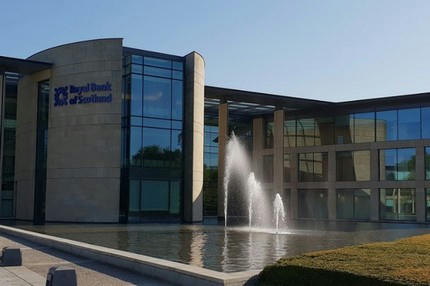
The Royal Bank of Scotland Group Headquarters in Gogarburn. The RBS owns National Westminster Bank (NatWest).
Declan dealt with the Financial Ombudsman Service (FOS) about the RBS's NatWest for over a year following the non-payment of his salary by standing order. The Financial Ombudsman effectively found in a final decision in this case that the Executive Case Manager at RBS wouldn't have been reasonably aware when she paid Declan compensation on 17 February 2020 - in recognition of issues he had experienced in setting up two replacement standing orders on the Network for Church Monitoring account - that there had been some error previously made by NatWest in setting up the replacement standing order for the payment of his salary. Declan's complaint about the subsequent cancellation of the standing order without his knowledge or consent that resulted in the non-payment of his salary on 24 February 2020 was passed by the investigator to an ombudsman, who is the former Team Manager at FOS and has held roles at Alliance and Leicester (now Santander). Below is a link to Declan's response to the ombudsman's published decision not to uphold his complaint.
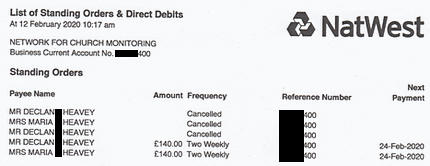
FOS investigator: "NatWest have said although the cancellation was processed on the 12th February 2020, it wasn't uploaded for processing until later – so it didn't actually cancel until the 19 February 2020."
26 March: NatWest Bank: Declan's response to the Financial Ombudsman's decision on their website. Pixsy continues to chase payment for the past non-commercial use of one image on the Church and State website
The above complaint concerning the non-payment by standing order of Declan's salary was only the first of three complaints about NatWest that he submitted to the FOS last year for resolution. The first of the other two complaints involved the wayward transfer in branch of £1,850 to St Mungo's by court order, after the cashier manually changed Declan's surname from Heavey to Henry. This was another complaint not upheld by the FOS, notwithstanding that Declan received £30 compensation with a final decision letter before the error was resolved with St Mungo's.
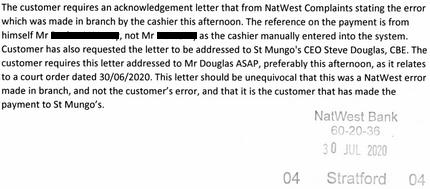
The FOS's third investigation is ongoing and relates to the second time, on 7 October 2020, we discovered that NatWest had made an error with the spelling of Declan's surname (Haeavey). I made the discovery when I attempted to make a payment to him online:
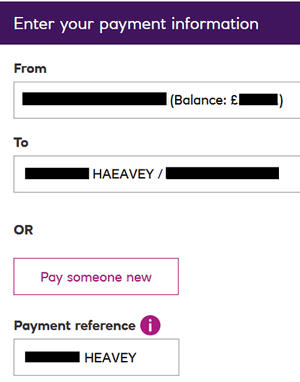
20 March: No quick fix from the Financial Ombudsman again this year. We're still waiting to be made public this Ombudsman's decision about the non-payment by standing order of Declan's salary last year. Laptop interference continues unabated

The Central London County Court is based at the Royal Courts of Justice.
The following is the full content of paragraph 4 under "Church and State" on this blog's sidebar that has been updated today.
4. This eviction matter came before District Judge Ruth Fine at the Central London County Court on 30 June 2020, when both counsel for St Mungo's (the charity in effective control of our tenancy) and Declan presented their positions. Declan lost the case and was ordered to pay £1,850 in costs. A publishing colleague in America cleared these costs within 24 hours of my blog post about this hearing for strike out on a related issue that was the essence of the claim, i.e., that St Mungo's would take a phone call to confirm that we are clients of the Mayor of London's RSI programme. Within a week of the hearing, St Mungo's had agreed to take this phone call for us both, the Court having ruled that they were not obliged to do so despite our circumstances. This time we escaped bankruptcy (counsel for St Mungo's asked for £3,407.50 in costs), but consider that to seek pro se access to justice in the courts has become far too dangerous for us. Declan currently has before the Parliamentary and Health Service Ombudsman the decision of the Information Commissioner that allows St Mungo's to continue processing coercive support plans without our knowledge or consent and that also poses a threat to his life.
30 June 2020: District Judge Ruth Fine orders Declan to pay £1,850 in costs. St Mungo's are under no obligation to even vouch over the phone that we are clients of the Mayor of London-commissioned St Mungo's TST programme (WITH UPDATE 08/06/21)[1]
__________________________
[1] Part of the Mayor of London's RSI programme in our case is access to the Mayor's Tenancy Sustainment Team (TST) at St Mungo's.
St Mungos management were repeatedly warned by their staff via Unite that their actions weere unethical, damaged the work of front line staff and were likley to be unlawful. The same senior managers remain in place https://t.co/ZSXwq3Xd81 #homelessness #ukhousing @labhomeless_cam
— UniteHousingWorkers (@UniteHousing) November 5, 2019
I am truly appalled by the unlawful violation of the Heavey's basic right to send and receive email without interference. I would be most grateful for anything you may be able to do by way of taking measures to correct this gross abuse.
An American professor to then Home Office Minister Lynne Featherstone in 2010

It has gotten to the stage where if I want to increase my chances of getting through to new people an email seeking permission to republish an article on Church and State, I must wait until I have at least three high quality permission emails to send. A success rate of one in five Church and State emails has become the norm for Declan.
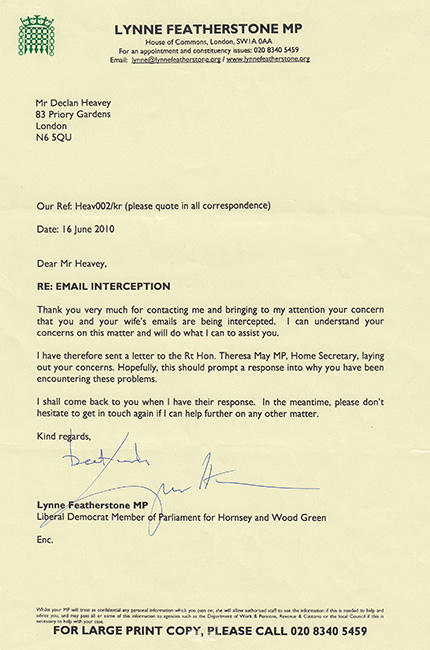

From My Picks:
8 June: Will the Parliamentary and Health Service Ombudsman investigate? Eviction back to the streets a third time from a Mayor of London Rough Sleepers Initiative property doesn't just constitute a death sentence for Declan. I am also likely to be left physically crippled for life (regularly updated)

Mayor of London Sadiq Khan
Our list of 303 Honorary Associates includes 20 Nobel Prize laureates, 18 US National Medal laureates and 13 knighted professors notwithstanding the excessive targeting of these categories of emails in particular. (In April Declan had the honour of adding the 20th Nobel laureate to the list, having had an average of 85% of his emails blocked for over a week.)
http://churchandstate.org.uk/honorary-associates/
"Let me recommend an important web site churchandstate.org.uk. Operating out of London this well-designed and exciting web site covers church-state, population, climate change and other issues. Check it out." Edd Doerr (1930-2020), (then) President, Americans for Religious Liberty

